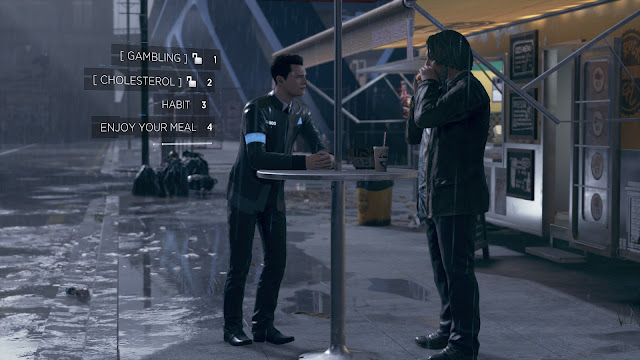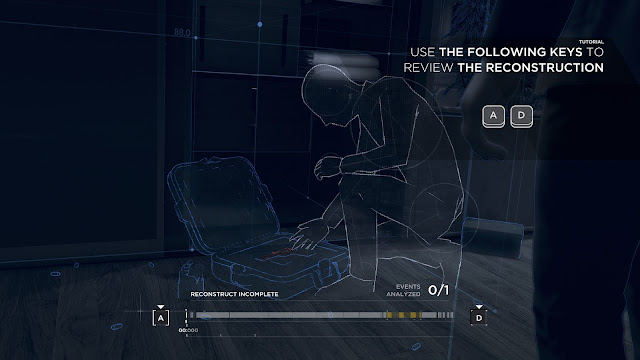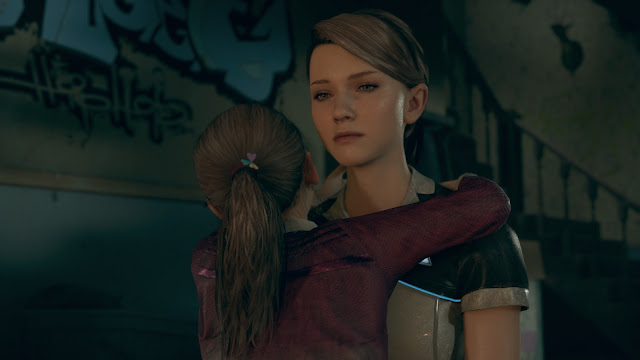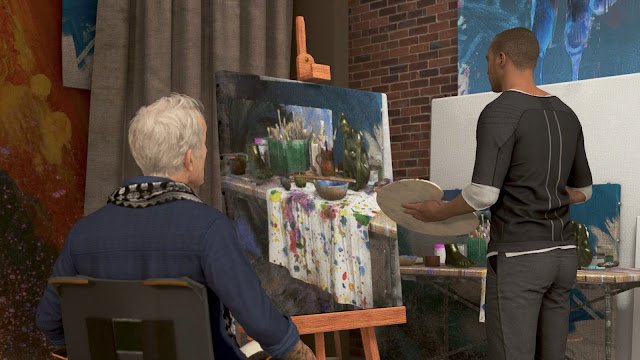 |
| Connor and Hank work well as a buddy cop duo |
| Quick Info | |
|---|---|
| Reviewed by: | Mark Goninon |
| Developer: | Quantic Dream |
| Publisher: | Quantic Dream |
| Release Date: | 18 Jun 2020 |
| Time played: | 10.7 hours |
We Are The Robots
I am not a stranger to David Cage's video games as I actually dabbled a bit with 2005's Fahrenheit (known as Indigo Prophecy in the United States) and actually quite liked it (probably why the game received an Honourable Mention on the Choicest Games Top 100). Sure, the game went a bit cuckoo towards the end and sometimes it felt like the game was trying too hard to stand out as a title for adults, but I liked the fact you could play with multiple protagonists and this would either help or hinder other characters (something that you see in later Quantic Dream games including this one). Fahrenheit was also what I consider a cinematic adventure game and it predates the rise of Telltale's cinematic adventure game experiences like 2012's The Walking Dead so Cage was definitely onto something but perhaps it was a bit ahead of its time.
I hadn't touched a Quantic Dream game for over a decade and totally missed the releases of Heavy Rain and Beyond: Two Souls but this is probably due to the fact they were console exclusives until very recently (they were released on Steam the same date as Detroit: Become Human: 18 Jun 2020) While I've wishlisted these titles, it was Detroit: Become Human that caught my attention the most as it's a sci-fi game about robots; Isaac Asimov is one of my favourite authors and besides the "Foundation" series, is renowned for his works of robot fiction and his Three Laws of Robotics. So basically, I like stories with robots and I just had to give this one a go.
 |
| Connor has the ability to reconstruct past events at crime scenes |
We Built This City on Cyberlife Droids
One of the first things you'll notice about this game are the photo-realistic graphics. Quantic Dream has been one of the companies on the forefront in this area and have not only used the voices of professional actors in their games but also their likeness. In Detroit: Become Human you mostly play the role of three androids: Markus (played by Jesse Williams of "Grey's Anatomy" fame), Connor (played by Bryan Dechart, most notable for "Jane By Design" ) and Kara (played by Valorie Curry, most notable for roles in "Veronica Mars" and "The Boys"). Through each of their stories you learn about the city of Detroit in 2038, where androids are now responsible for much of the labour and they come in many models including maids, butlers, janitors, sex workers and even forensic investigators, thanks to a corporation called Cyberlife. Through each of their stories you'll be able to look at this near-future world through a different lens seeing how humans react to the sudden creation of a race of androids taking their jobs and infiltrating almost every aspect of their lives. It probably comes as no surprise, but things get pretty ugly and it's not long till each of the characters you play encounter conflict but the way you relate to the supporting characters in this story, and even the other player characters, will depend on what you do and what you say.
 |
| Kara's story revolves around her and her relationship with a little girl named Alice |
EMOTIONAL DAMAGE
Each chapter of the game will have you controlling one of the three androids and they'll be tasked with a particular objective. Action sequences in the game are heavily reliant on QTEs similar to earlier David Cage games and indeed Telltale adventures. It's not the most ideal option and is often frustrating, especially when you're attempting to hold down multiple keys at once, so I think it's a game that's better with a controller, not your usual keyboard and mouse. However, if you play your cards right, sometimes you can avoid conflict (and in turn QTE sequences) altogether provided you pick up clues or items beforehand.
As you explore a chapter, you're given the opportunity to examine your surroundings and sometimes particular items can unlock future branches in the story (such as new conversation options or the ability to shoot a threat because you've acquired a gun). In fact, completing a chapter will show a tree of available choices and the course you plotted through it, encouraging you to replay the game to explore each and every one of the branches. For some players, there may even be an extra incentive since the main characters can actually "die" prematurely and they will no longer feature in future chapters. During my playthrough, this is what happened with one of my characters and while it was gut-wrenching when it occurred, I still managed to achieve a melancholic, pyrrhic victory. My ending wasn't a "good" or a "bad" ending and sat somewhere in between. I think it's to the game's credit that you're able to still manage a satisfactory conclusion from a messy first playthrough (which took around 10 hours to complete).
 |
| Markus's creativity is encouraged by artist Carl Manfred (played by Lance Henriksen) |
"I Have to Remind Myself Some Birds Aren't Meant to Be Caged"
The game is jam-packed with references to other media as well as actual history: this ranges from references to the cyberpunk genre, such as Deus Ex, "The Matrix" and indeed "Robocop" (a film about another near-future Detroit with robots), to other genres such as superhero fiction ("X-Men") and prison drama ("The Shawshank Redemption"). There are many scenes grabbed from other media that are given extra emotional heft when you have the opportunity to play the protagonist: to be Neo the Chosen One, to finally decide whether Xavier or Magneto is right, to feel what Andy Dufresne feels as he climbs out of the muck and is born again, a new man. The game isn't afraid to tackle very dark issues such as child abuse (which can be quite distressing to a parent or triggering for those that have experienced it first hand) and yet also touches beautiful themes of self-determination and the potential for androids to be more than their programming. And if you want a heartwarming buddy cop movie, selecting particular options will give you that too: Connor and Hank's tumultuous relationship, with Hank played by Clancy Brown, is one of my favourites in this game.
The icing on the cake is the soundtrack, which is composed by not one but three composers, one for each of the androids: Nima Fakhara for Connor's soundtrack, Philip Sheppard for Kara's soundtrack and John Paesano for Markus's soundtrack. Detroit: Become Human wants to pull at your heart strings and its soundtrack is there to ensure you will feel something. My favourite has to be Kara's theme by Philip Sheppard as I find it the most memorable: it's also the perfect accompaniment to an iconic scene in Kara's story.
|
8
|
Detroit: Become Human is a game that is many things. While you'll be experiencing it all as an android, it allows you to feel like Neo from "The Matrix", Andy Dufresne from "The Shawshank Redemption" and sometimes even Murtaugh from "Lethal Weapon". It borrows heavily from pop culture and actual history but if you're okay with that you'll be treated to a cinematic and emotional experience with top notch graphics, voice acting and music. |
If you like this game, you might like…
Special thanks to my friend and Choicest Games contributor Luke for gifting me Steam credit for Christmas 2023 which enabled me to purchase this game. He was also the one who recommended I try it out.
Comments
Post a Comment